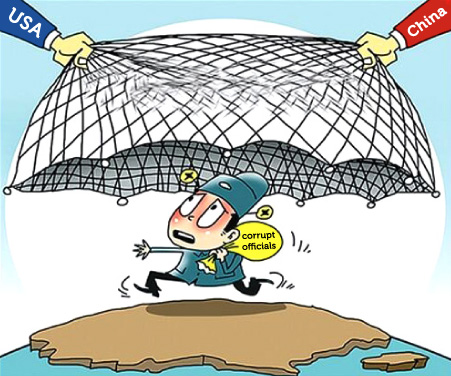


An all-round upgrade of Sino-US anti-corruption cooperation
Aimed at pursuing fugitives and illicit money escaping to other countries, China’s Operation “Skynet”, an upgraded version of the special operation “Fox Hunting” was comprehensively activated in April. It is directly focused on corrupt officials escaping overseas, and aimed at eliminating shady corners of corruption and cutting off the escape route of corrupt officials.
From “Fox Hunting” to “Skynet” - Cooperation in tracking fugitives and illicit money is enhanced
As China’s overseas measures against corruption tighten, corrupt officials escaping to the U.S. are feeling the approach of an impending storm. From Operation “Fox Hunting” to Operation “Skynet”, Sino-US anti-corruption cooperation is speeding up.
For a long time, common law loopholes and loose immigration policies made America a safe haven for corrupt officials escaping from China. Corrupt officials escaping to America have been “beyond the arm of the law” due to the differences in political systems, legal systems, and ideologies, and the absence of any extradition treaty between the two sides.
However, as China's anti-corruption campaign strengthens, the situation is changing. On the one hand, the United States hopes to remove its stigma as “the paradise of corrupt officials”, and on the other hand, it wants China to assist its own implementation of Foreign Corrupt Practices Act, focusing on closing loopholes allowing overseas tax evasion by American citizens. This gives an incentive to cooperate with China.
Bypassing the threshold of extradition treaty – Seeking alternative anti-corruption measures.
Although some progress has been made, Sino-US anti-corruption cooperation is still faced with great challenges. One of the main challenges is the lack of an extradition treaty between the two sides, which makes it hard for China to capture, prosecute and repatriate corrupt officials escaping to America through normal channels. The only option currently available is to negotiate with the United States on a case-by-case basis. However, both China and the U.S. have promised that their cooperation in chasing fugitives and illicit money will not and should not be hindered by the lack of an extradition treaty.
Psaki, a spokesperson for the United States Department of State, says that the United States can repatriate Chinese fugitives through immigration procedures in spite of the absence of an extradition treaty and she also emphasizes that anti-corruption cooperation with China is led by the U.S. Department of Justice. If China can provide persuasive evidence, the U.S. will be prompted to attach more importance to key cases, including seeking, prosecuting and repatriating escaped criminals.
Meanwhile, Sino-US cooperation in going after escaped criminals and illicit money can also be carried out through such platforms as the United Nations Convention against Corruption, U.N. Convention against Transnational Organized Crime, and the APEC anti-corruption law enforcement agency net. America also has some “alternatives” for repatriating corrupt officials.
According to legal experts, these “alternatives” mainly involve prosecuting corrupt Chinese officials for common charges such as immigration fraud and money laundering, so as to allow the U.S. immigration court to deport them. China, of course, can also choose nonlocal prosecution to bring lawsuits against corrupt officials in the United States. It can be said that these measures pose real threat to corrupt officials , which is because it is hard for most of them to shake off the charges of immigration fraud, money laundering, and so on.
To allow them to stay in America, all corrupt officials are involved in some kind of immigration fraud, whether by overstaying their visa and becoming “unregistered households”, obtaining an investment immigration green card with illicit money, or inventing false pretexts such as the one-child policy or religious persecution to claim political asylum.
The good news is that there have already been successful outcomes through Sino-US cooperation in going after fugitives and illicit money. In 2004, through law enforcement liaison, the United States deported to China Yu Zhendong, the principal criminal involved in the theft of hundreds of millions of dollars from BOC Kaiping Branch - the first successful case of Sino-US judicial cooperation. In 2009, Xu Chaofan and Xu Guojun, two other former presidents of this branch of BOC, were jailed for 25 years and 22 years respectively by an American court for money laundering, fraud, and passport and visa forging, where China provided the United States with strong evidence.
From the case of BOC Kaiping branch to Qiao Jianjun’s case, the charges prosecuted by the U.S. were all related to immigration fraud and money laundering, which is expected to be the main mode of Sino-US cooperation in going after illicit money and fugitives for the foreseeable future.
The article is edited and translated from《”天网”撒向逃美贪官中美反腐合作全面升级》, source: People'sDaily.
 J-11 fighters in air exercise
J-11 fighters in air exercise Beauties dancing on the rings
Beauties dancing on the rings Attendants-to-be join Mr. & Miss Campus Contest
Attendants-to-be join Mr. & Miss Campus Contest Beijing's toughest anti-smoking law takes effect
Beijing's toughest anti-smoking law takes effect Family lives in cave for about 50 years in SW China
Family lives in cave for about 50 years in SW China PLA soldiers operating vehicle-mounted guns in drill
PLA soldiers operating vehicle-mounted guns in drill Blind carpenter in E China's Jiangxi
Blind carpenter in E China's Jiangxi China hosts overseas disaster relief exercise for the first time
China hosts overseas disaster relief exercise for the first time 20 pairs of twins who will become flight attendants in Sichuan
20 pairs of twins who will become flight attendants in Sichuan Obama is sowing discontent in S.China Sea
Obama is sowing discontent in S.China Sea Rescuers work through night to reach cruise ship survivors
Rescuers work through night to reach cruise ship survivors Driving through limbo
Driving through limbo Facing down MERS
Facing down MERSDay|Week